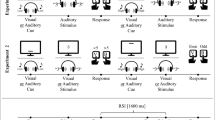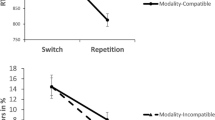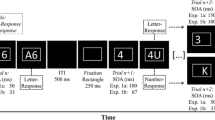Abstract
In the task-switching paradigm, mixing costs indicate the performance costs to mix two different tasks, while switch costs indicate the performance costs to switch between two sequentially presented tasks. Applying tasks with bivalent stimuli and responses, many studies demonstrated substantial mixing and switch costs and a reduction of these costs as a result of practice. The present study investigates whether extensive practice of a task-switching situation including tasks with univalent stimuli eliminates these costs. Participants practiced switching between a visual and an auditory task. These tasks were chosen because they had shown eliminated performance costs in a comparable dual-task practice study (Schumacher et al. Psychol Sci 12:101–108, 2001). Participants either performed the tasks with univalent responses (i.e., visual-manual and auditory-verbal stimulus–response mappings) or bivalent responses (i.e., visual-manual and auditory-manual stimulus–response mappings). Both valence conditions revealed substantial mixing and switch costs at the beginning of practice, yet, mixing costs were largely eliminated after eight practice sessions while switch costs were still existent.

Similar content being viewed by others
References
Allport, A., Styles, E. A., & Hsieh, S. (1994). Shifting intentional set: Exploring the dynamic control of tasks. In C. Umilta & M. Moscovitch (Eds.), Conscious and Nonconscious Information Processing: Attention and Performance XV (pp. 421–452). Cambridge, MA: MIT Press.
Altmann, E. M. (2004). The preparation effect in task switching: Carryover of SOA. Memory & Cognition, 32, 153–163.
Beringer, J. (2000). Experimental Runtime System. Frankfurt am Main: BeriSoft Cooperation.
Berryhill, M. E., & Hughes, H. C. (2009). On the minimization of task switch costs following long-term training. Attention, Perception & Psychophysics, 71, 503–514.
Cepeda, N. J., Kramer, A. F., & Gonzalez de Sather, J. C. M. (2001). Changes in executive control across the life span: Examination of task-switching performance. Developmental Psychology, 37, 715–730.
Hazeltine, E., Teague, D., & Ivry, R. (2002). Simultaneous dual-task performance reveals parallel response selection after practice. Journal of Experimental Psychology: Human Perception and Performance, 28, 527–545.
Hoffmann, J., Kiesel, A., & Sebald, A. (2003). Task switches under Go/NoGo conditions and the decomposition of switch costs. European Journal of Cognitive Psychology, 15, 101–128.
Karbach, J., & Kray, J. (2009). How useful is executive control training? Age differences in near and far transfer of task-switching training. Developmental Science, 12(6), 978–990.
Kiesel, A., Steinhauser, M., Wendt, M., Falkenstein, M., Jost, K., Phillip, A., et al. (2010). Control and interference in task switching—A review. Psychological Bulletin, 136, 849–874.
Kiesel, A., Wendt, M., & Peters, A. (2007). Task switching: On the origins of response congruency effects. Psychological Research, 71, 117–125.
Kleinsorge, T. (1999). Response repetition benefits and costs. Acta Psychologica, 103, 295–310.
Koch, I., & Allport, A. (2006). Cue-based preparation and stimulus-based priming of tasks in task switching. Memory & Cognition, 34, 433–444.
Koch, I., Prinz, W., & Allport, A. (2005). Involuntary retrieval in alphabet-arithmetic tasks: Task-mixing and task-switching costs. Psychological Research, 69, 252–261.
Kray, J., & Eppinger, B. (2006). Effects of associative learning on age differences in task-set switching. Acta Psychologica, 123, 187–203.
Kray, J., & Lindenberger, U. (2000). Adult age differences in task switching. Psychology and Aging, 15, 126–147.
Liepelt, R., Fischer, R., Frensch, P. A., & Schubert, T. (2011). Practice-related reduction of dual-task costs under conditions of a manual-pedal response combination. Journal of Cognitive Psychology, 23, 29–44.
Liepelt, R., Strobach, T., Frensch, P. A., & Schubert, T. (in press). Improved inter-task coordination after extensive dual-task practice. Quarterly Journal of Experimental Psychology.
Maquestiaux, F., Laguẽ-Beauvais, M., Ruthruff, E., & Bherer, L. (2008). Bypassing the central bottleneck after single-task practice in the psychological refractory period paradigm: Evidence for task automatization and greedy resource recruitment. Memory & Cognition, 36(7), 1262–1282.
Mayr, U. (2001). Age differences in the selection of mental sets: The role of inhibition, stimulus ambiguity, and response-set overlap. Psychology & Aging, 16, 96–109.
Mayr, U., & Keele, S. W. (2000). Changing internal constraints on action: The role of backward inhibition. Journal of Experimental Psychology: General, 129, 4–26.
Meiran, N. (2000). Reconfiguration of stimulus task-sets and response task-sets during task-switching. In S. Monsell & J. Driver (Eds.), Attention and Performance XVIII: Control of Cognitive Processes (pp. 377–400). Cambridge, MA: MIT Press.
Meyer, D. E., & Kieras, D. E. (1997). A computational theory of executive cognitive processes and multiple-task performance: Part 1 Basic mechanisms. Psychological Review, 104, 3–65.
Monsell, S. (2003). Task switching. Trends in Cognitive Sciences, 7, 134–140.
Pashler, H. (1994). Dual-task interference in simple tasks: Data and theory. Psychological Bulletin, 116, 220–244.
Pashler, H. (2000). Task switching and multitask performance. In S. Monsell & J. Driver (Eds.), Attention and Performance XVIII: Control of Mental Processes (pp. 277–307). Cambridge, MA: MIT Press.
Philipp, A. M., & Koch, I. (2005). Switching of response modalities. Quarterly Journal of Experimental Psychology, 58A, 1325–1338.
Rogers, R. D., & Monsell, S. (1995). Costs of a predictable switch between simple cognitive tasks. Journal of Experimental Psychology: General, 124, 207–231.
Rubin, O., & Meiran, N. (2005). On the origins of the task mixing cost in the cuing task-switching paradigm. Journal of Experimental Psychology: Learning, Memory, and Cognition, 31, 1477–1491.
Rubinstein, J. S., Meyer, D. E., & Evans, J. E. (2001). Executive control of cognitive processes in task switching. Journal of Experimental Psychology: Human Perception, & Performance, 27, 763–797.
Ruthruff, E., Van Selst, M., Johnston, J. C., & Remington, R. W. (2006). How does practice reduce dual-task interference: Integration, automatization, or simply stage-shortening? Psychological Research, 70, 125–142.
Schubert, T. (1999). Processing differences between simple and choice reaction affect bottleneck localization in overlapping tasks. Journal of Experimental Psychology: Human Perception and Performance, 25, 408–425.
Schumacher, E. H., Seymour, T. L., Glass, J. M., Fencsik, D. E., Lauber, E. J., Kieras, D. E., et al. (2001). Virtually perfect time sharing in dual-task performance: Uncorking the central cognitive bottleneck. Psychological Science, 12(2), 101–108.
Steinhauser, M., & Hübner, R. (2005). Mixing costs in task-shifting reflect sequential processing stages in a multicomponent task. Memory & Cognition, 33, 1484–1494.
Strobach, T., Frensch, P. A., & Schubert, T. (2008). The temporal stability of skilled dual-task performance. In H. D. Zimmer, C. Frings, A. Mecklinger, B. Opitz, M. Pospeschill, & D. Wentura (Eds.), Cognitive Science 2007. Proceedings of the 8th Annual Conference of the Cognitive Science Society of Germany. Saarbrücken.
Sudevan, P., & Taylor, D. A. (1987). The cuing and priming of cognitive operations. Journal of Experimental Psychology: Human Perception and Performance, 13, 89–103.
Tombu, M., & Jolicoeur, P. (2004). Virtually no evidence for virtually perfect time-sharing. Journal of Experimental Psychology: Human Perception and Performance, 30, 795–810.
Wendt, M., & Kiesel, A. (2008). The impact of stimulus-specific practice and task instructions on response congruency effects between tasks. Psychological Research, 72, 425–432.
Yeung, N., & Monsell, S. (2003). Switching between tasks of unequal familiarity: The role of stimulus-attribute and response-set selection. Journal of Experimental Psychology: Human Perception and Performance, 29, 455–469.
Acknowledgments
The present research was supported by Grants of the Deutsche Forschungsgemeinschaft (DFG) (grant Ho 1301/8-1,2,3; grant Schu-1397/2-3 to T. S. [third author]). Thanks to Marco Steinhauser and Thomas Kleinsorge for their helpful comments on an earlier draft of this article.
Author information
Authors and Affiliations
Corresponding author
Rights and permissions
About this article
Cite this article
Strobach, T., Liepelt, R., Schubert, T. et al. Task switching: effects of practice on switch and mixing costs. Psychological Research 76, 74–83 (2012). https://doi.org/10.1007/s00426-011-0323-x
Received:
Accepted:
Published:
Issue Date:
DOI: https://doi.org/10.1007/s00426-011-0323-x




